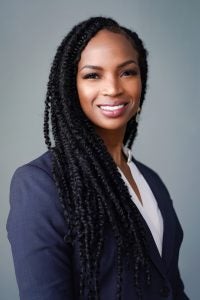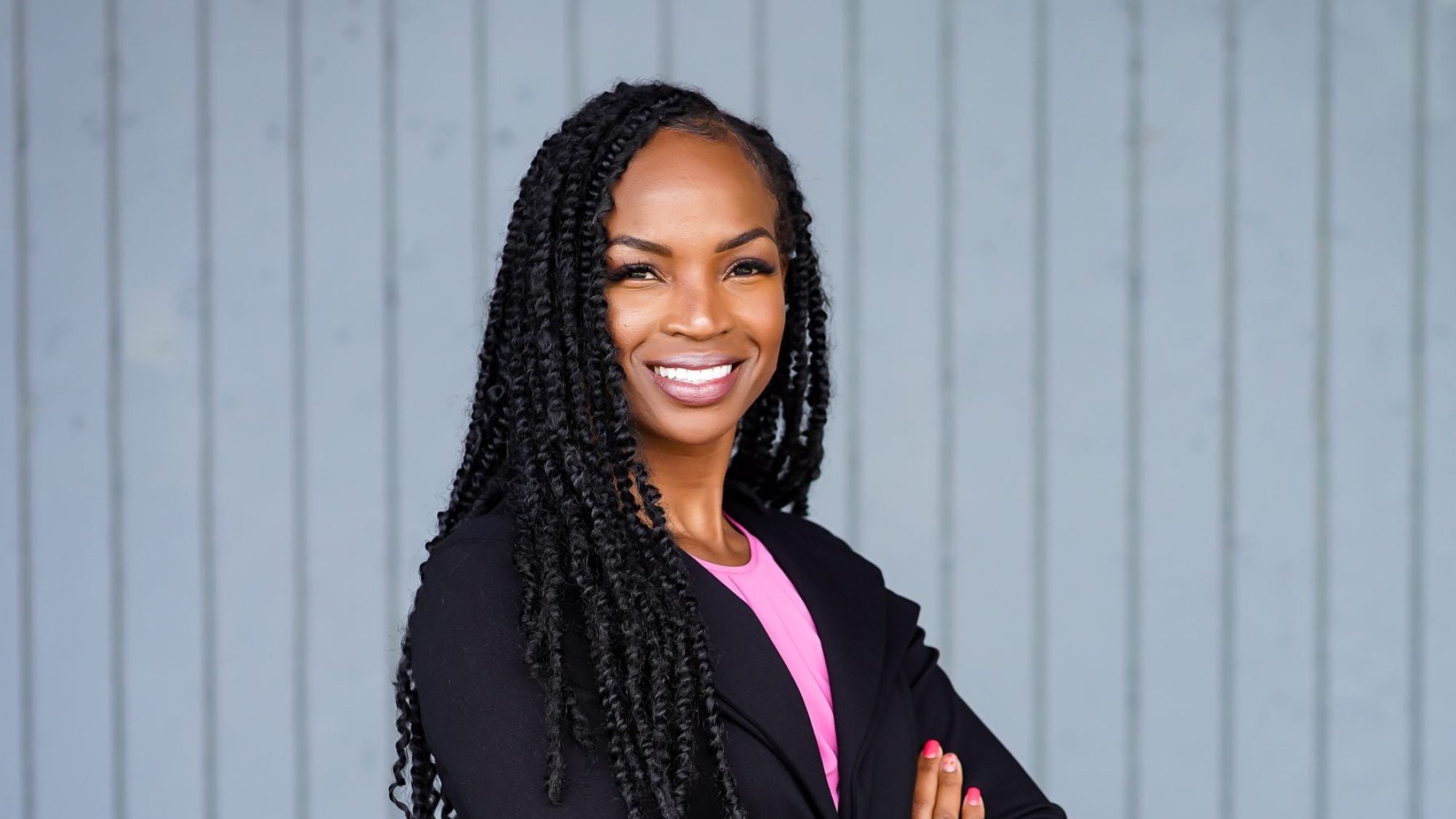Jamillah Bowman Williams (B’03) was first drawn to Georgetown over two decades ago as a student-athlete. A member of the Georgetown women’s track and field team, she appreciated how Georgetown saw her as a student first and the university’s dedication to social justice.
 Georgetown’s commitment to social justice is one of the reasons she returned to Georgetown. In 2015, she joined the faculty at Georgetown Law as an expert in antidiscrimination law after earning her master’s in education from the University of Michigan and a sociology Ph.D. and J.D. from Stanford University.
Georgetown’s commitment to social justice is one of the reasons she returned to Georgetown. In 2015, she joined the faculty at Georgetown Law as an expert in antidiscrimination law after earning her master’s in education from the University of Michigan and a sociology Ph.D. and J.D. from Stanford University.
“That was one of the big attractions for me in coming back, having social justice as central to the mission of the university,” she said. “I felt I wouldn’t have to fight for it along the way and explain why I was so committed to both the broader social movements as well as connecting with the community and connecting students with the community to do some of that social justice work.”
Now, Williams will continue to advance the university’s commitment to social justice as the inaugural associate vice president of gender equity and chair of the Gender Equity Committee.
Starting her new role on July 1, 2025, Williams will deepen and expand Georgetown’s commitment to gender equity, facilitate the implementation of the committee’s recommendations and identify new areas of work to advance gender equity at Georgetown.
Over the next year, Williams will work closely with Rosemary Kilkenny, the vice president for institutional diversity, equity and inclusion and the chief diversity officer, to ensure Williams is well-positioned to assume her role next July while continuing her teaching and scholarship.
“We are excited to welcome Jamillah to the team to assume the important role of advancing gender equity at Georgetown,” Kilkenny said. “Gender equity is integral to our mission at Georgetown, and I am looking forward to working with Jamillah as she takes on this important responsibility.”
As part of the transition, the Gender Equity Committee co-chairs — Soyica Diggs Colbert, the vice president for interdisciplinary initiatives and Idol Family Professor of African American Studies and Performing Arts, and Naomi Mezey, the Agnes Williams Sesquicentennial Professor of Law and Culture — will work with Kilkenny to ensure a smooth transition for when Williams will take on the role of Gender Equity Committee chair next summer.
Get to know Williams and her hopes and goals as the new associate vice president of gender equity at Georgetown.
Meet Jamillah Bowman Williams
Why did you choose Georgetown for your undergraduate studies?
I am an athlete. For undergrad, I chose Georgetown because of its unique combination of being both a top-tier educational institution, as well as its nationally competitive track team. I was an All-American sprinter and hurdler during my time here, but it was also unique because I knew that I would be seen as a student first.
I was also attracted to the social justice mission of the university. I felt that when I came on campus. I felt there were many brilliant people who I was meeting during my visit here, but they were also down to earth, and I met people who cared about the world.
What motivated you to pursue academia in the legal field?
I realized it would be a good fit for me as an interdisciplinary scholar. I studied business in undergrad, then went on to do the education master’s, then my sociology Ph.D. A lot of what I did in sociology was informed by social psychology. As an interdisciplinary scholar committed to social justice, this was a good path.
For the law in particular, I feel like the law can be used as an instrument of social change. That’s important to me. There’s also room to critique the law as well when it comes up short. That’s particularly [true] for marginalized communities that I work and study with.
What got you interested in anti-discrimination law?
I’m interested in some of the hierarchies we see play out in society, more specifically some of the systemic inequalities, whether it be education, health or workplace outcomes.
How do we grapple with them? How do we navigate them? How do we put things in place to counter them to some extent? That got me interested in anti-discrimination law. Law is one means to address the problems or at least it is set up with the purpose of addressing or remedying some of those problems.
Why did you decide to return to Georgetown as a faculty member at Georgetown Law?
The DMV is a great place to be and to live both personally and professionally. I already had the roots at Georgetown from going here for undergrad. I like the fact that Georgetown acknowledged its history with slavery and the continuing legacy of slavery and made a commitment to begin to reconcile some of that.
I’m someone who likes to do my work within the institution, with my students, with my colleagues, all the publishing and academic journals, but I also like engaging with the community to both develop knowledge and disseminate [knowledge], so the engagement with community was also an important factor to me.
What goals do you have in your new role to advance gender equity at Georgetown?
What I want to do is to help build connections and community across the university. Some of it will be within departments, and some of it will be across the campus, and to use those connections to help advance gender equity.
My research is focused on race, gender, and economic justice, and I specialize in empirical analysis, so I feel like I can bring that as a skill set. There’s a lot of data that we have, so taking a deeper dive into the data, that allows us to begin to assess what some of the core needs are around gender equity.
Why is gender equity important, especially at a place like Georgetown?
Gender equity is going to be of central importance if you’re at a Jesuit institution committed to social justice more broadly.
I will be focusing primarily on faculty members. Many faculty are navigating unique challenges that are shaped by gender, and this too often goes unacknowledged. This work helps advance the broader social justice goals of the university, but it also offers an opportunity to help unleash all of the talent and potential that we have. I think we have the best and brightest to offer to the world, but sometimes there are things that can hinder that. Once you uncover some of that and tackle it, you have even more to offer.
